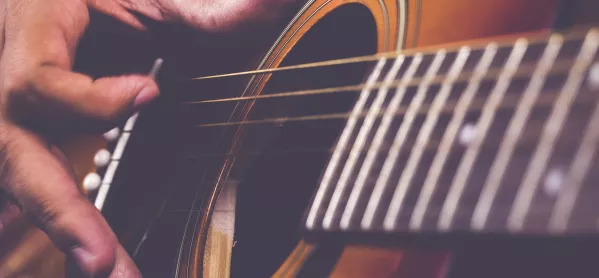Music has become a casualty of the English Baccalaureate, with the majority of teachers in state schools warning of a drop in pupils studying the arts subject, according to new research released today.
The finding is the result of research by the University of Sussex’s school of education and social work, which surveyed 657 state schools in England last year.
The majority of respondents were heads of music or their equivalent. Some 60 per cent said that the EBacc was having a negative impact on the provision and uptake of music and on the wider curriculum, according to researchers. Just 3 per cent of teachers thought the EBacc had resulted in a positive impact.
Music is not included in the government’s school performance measure for the EBacc - based on pupils getting grade C or above in five subjects (English, mathematics, history or geography, the sciences and a language) at GCSE. Despite being a mandatory part of the national curriculum, music was only compulsory for Year 9 pupils in 62 per cent of schools in 2016 - down from 84 per cent in 2012. The number of schools offering music at GCSE level fell from 85 per cent in 2012 to 79 per cent in 2016.
Duncan Mackrill, a senior lecturer in education at the University of Sussex, said: “Our research clearly shows the EBacc is having a detrimental effect on the uptake of music in state secondary schools. We also have evidence that the EBacc policy has resulted in a negative impact on the wider musical life of schools as well as curriculum provision.”
Some schools ‘could lose the subject’
He added: “The future of music as an academic subject is precariously balanced, with curriculum time having reduced significantly at key stage 3 in many state schools over the last five years. This government needs to take appropriate action to prevent the further erosion of music in secondary schools - before we lose the subject in some schools for good.”
Dr Ally Daubney, a teaching fellow in education at the University of Sussex, who co-authored the new research, commented: “The threat of the government implementing their policy of ‘at least 90 per cent of pupils in mainstream secondary school to be included within EBacc by 2020’ is having a significantly negative impact across secondary school provision and means that music as a subject could be facing extinction.”
The results of the survey are in stark contrast to a recent report by the New Schools Network, which claimed that the EBacc has had “no discernible impact” on the popularity of the arts at GCSE.
Responding to the new research, Toby Young, director of the New Schools Network, said: “Our report showed that the arts have actually proven more popular at GCSE since the EBacc was introduced. The published data from the Department for Education shows very clearly that more students took GCSE music in 2015-16 than they did in 2011-12, despite an overall fall in the cohort size.
“We agree that children should be encouraged to take creative subjects alongside an academic curriculum, and that is why we have called upon arts organisations to engage with the free-schools programme and take a more proactive role in promoting arts and music in England’s schools.”
In a statement, a Department for Education spokesperson defended the EBacc as a key part of the government’s “drive to extend opportunity for all.”
They added: “As a report from the New Schools Network showed last month, there is no evidence that the EBacc has negatively affected entries into arts GCSEs. Music and the arts are key to a well-rounded education, which is why in November 2016 we announced a package of funding that will increase pupils’ access to music and cultural education. This includes £300 million for music education hubs for 2016-20.”
But Simon Williamson, director of music at Wellington College, and president-elect of MMA, the National Association of Music Teaching Professionals, commented: “We are very worried about the impact that the EBacc is having upon the teaching of music within the curriculum and the inevitable loss of jobs for music teachers. This report is very worrying for all arts teachers.”
He added: “Surely the EBacc is in danger of creating a less cultured, non-creative society for the future?”
Want to keep up with the latest education news and opinion? Follow Tes on Twitter, Instagram and like Tes on Facebook.





